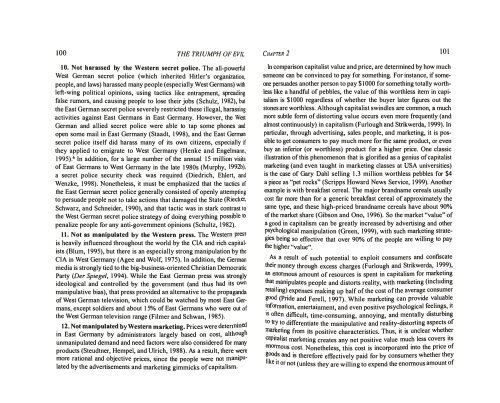austin-murphy-the-triumph-of-evil
austin-murphy-the-triumph-of-evil
austin-murphy-the-triumph-of-evil
Create successful ePaper yourself
Turn your PDF publications into a flip-book with our unique Google optimized e-Paper software.
100 THE TRIUMPH OF EVIL<br />
10. Not harassed by <strong>the</strong> Western secret police. The all-powerful<br />
West German secret police (which inherited Hitler's organization,<br />
people, and laws) harassed many people (especially West Germans) with<br />
left-wing political opinions, using tactics like entrapment, spreading<br />
false rumors, and causing people to lose <strong>the</strong>ir jobs (Schulz, 1982), but<br />
<strong>the</strong> East German secret police severely restricted <strong>the</strong>se illegal, harassing<br />
activities against East Germans in East Germany. However, <strong>the</strong> West<br />
German and allied secret police were able to tap some phones and<br />
open some mail in East Germany (Staadt, 1998), and <strong>the</strong> East German<br />
secret police itself did harass many <strong>of</strong> its own citizens, especially if<br />
<strong>the</strong>y applied to emigrate to West Germany (Henke and Engelmann,<br />
1995). 6 In addition, for a large number <strong>of</strong> <strong>the</strong> annual 15 million visits<br />
<strong>of</strong> East Germans to West Germany in <strong>the</strong> late 1980s (Murphy, 1992b),<br />
a secret police security check was required (Diedrich, Ehlert, and<br />
Wenzke, 1998). None<strong>the</strong>less, it must be emphasized that <strong>the</strong> tactics <strong>of</strong><br />
<strong>the</strong> East German secret police generally consisted <strong>of</strong> openly attempting<br />
to persuade people not to take actions that damaged <strong>the</strong> State (Riecker,<br />
Schwarz, and Schneider, 1990), and that tactic was in stark contrast to<br />
<strong>the</strong> West German secret police strategy <strong>of</strong> doing everything possible to<br />
penalize people for any anti-government opinions (Schultz, 1982).<br />
11. Not as manipulated by <strong>the</strong> Western press. The Western press<br />
is heavily influenced throughout <strong>the</strong> world by <strong>the</strong> CIA and rich capital·<br />
ists (Blum, 1995), but <strong>the</strong>re is an especially strong manipulation by <strong>the</strong><br />
CIA in West Germany (Agee and Wolf, 1975). In addition, <strong>the</strong> German<br />
media is strongly tied to <strong>the</strong> big-business-oriented Christian Democratic<br />
Party (Der Spiegel, 1994). While <strong>the</strong> East German press was strongly<br />
ideological and controlled by <strong>the</strong> government (and thus had its own<br />
manipulative bias), that press provided an alternative to <strong>the</strong> propaganda<br />
<strong>of</strong> West German television, which could be watched by most East Ger·<br />
mans, except soldiers and about 1 5% <strong>of</strong> East Germans who were out <strong>of</strong><br />
<strong>the</strong> West German television range (Filmer and Schwan, 1985).<br />
12. Not manipulated by Western marketing. Prices were determined<br />
in East Germany by administrators largely based on cost, although<br />
unmanipulated demand and need factors were also considered for many<br />
products (Steudtner, Hempel, and Ulrich, 1988). As a result, <strong>the</strong>re were<br />
more rational and objective prices, since <strong>the</strong> people were not manipu·<br />
lated by <strong>the</strong> advertisements and marketing gimmicks <strong>of</strong> capitalism.<br />
CHAPTER 2<br />
In comparison capitalist value and price, are determined by how much<br />
someone can be convinced to pay for something. For instance, if someone<br />
persuades ano<strong>the</strong>r person to pay $1000 for something totally worthless<br />
like a handful <strong>of</strong> pebbles, <strong>the</strong> value <strong>of</strong> this worthless item in capitalism<br />
is $1000 regardless <strong>of</strong> whe<strong>the</strong>r <strong>the</strong> buyer later figures out <strong>the</strong><br />
stones are worthless. Although capitalist swindles are common, a much<br />
more subtle form <strong>of</strong> distorting value occurs even more frequently (and<br />
almost continuously) in capitalism (Furlough and Strikwerda, 1999). In<br />
particular, through advertising, sales people, and marketing, it is possible<br />
to get consumers to pay much more for <strong>the</strong> same product, or even<br />
buy an inferior (or worthless) product for a higher price. One classic<br />
illustration <strong>of</strong> this phenomenon that is glorified as a genius <strong>of</strong> capitalist<br />
marketing (and even taught in marketing classes at USA universities)<br />
is <strong>the</strong> case <strong>of</strong> Gary Dahl selling 1.3 million worthless pebbles for $4<br />
a piece as "pet rocks" (Scripps Howard News Service, 1999). Ano<strong>the</strong>r<br />
example is with breakfast cereal. The major brandname cereals usually<br />
cost far more than for a generic breakfast cereal <strong>of</strong> approximately <strong>the</strong><br />
same type, and <strong>the</strong>se high-priced brandname cereals have about 90%<br />
<strong>of</strong> <strong>the</strong> market share (Gibson and Ono, 1996). So <strong>the</strong> market "value" <strong>of</strong><br />
a good in capitalism can be greatly increased by advertising and o<strong>the</strong>r<br />
psychological manipulation (Green, 1999), with such marketing strategies<br />
being so effective that over 90% <strong>of</strong> <strong>the</strong> people are willing to pay<br />
<strong>the</strong> higher "value".<br />
As a result <strong>of</strong> such potential to exploit consumers and confiscate<br />
<strong>the</strong>ir money through excess charges (Furlough and Strikwerda, 1999),<br />
an enormous amount <strong>of</strong> resources is spent in capitalism for marketing<br />
that manipulates people and distorts reality, with marketing (including<br />
retailing) expenses making up half <strong>of</strong> <strong>the</strong> cost <strong>of</strong> <strong>the</strong> average consumer<br />
�ood (Pride and Ferell, 1997). While marketing can provide valuable<br />
� nformation, entertainment, and even positive psychological feelings, it<br />
18 <strong>of</strong>ten difficult, time-consuming, annoying, and mentally disturbing<br />
to try to differentiate <strong>the</strong> manipulative and reality-distorting aspects <strong>of</strong><br />
marketing from its positive characteristics. Thus, it is unclear whe<strong>the</strong>r<br />
capitalist marketing creates any net positive value much less covers its<br />
enormous cost. None<strong>the</strong>less, this cost is incorporated into <strong>the</strong> price <strong>of</strong><br />
��s and is <strong>the</strong>refore effectively paid for by consumers whe<strong>the</strong>r <strong>the</strong>y<br />
hke It or not (unless <strong>the</strong>y are willing to expend <strong>the</strong> enormous amount <strong>of</strong><br />
101


